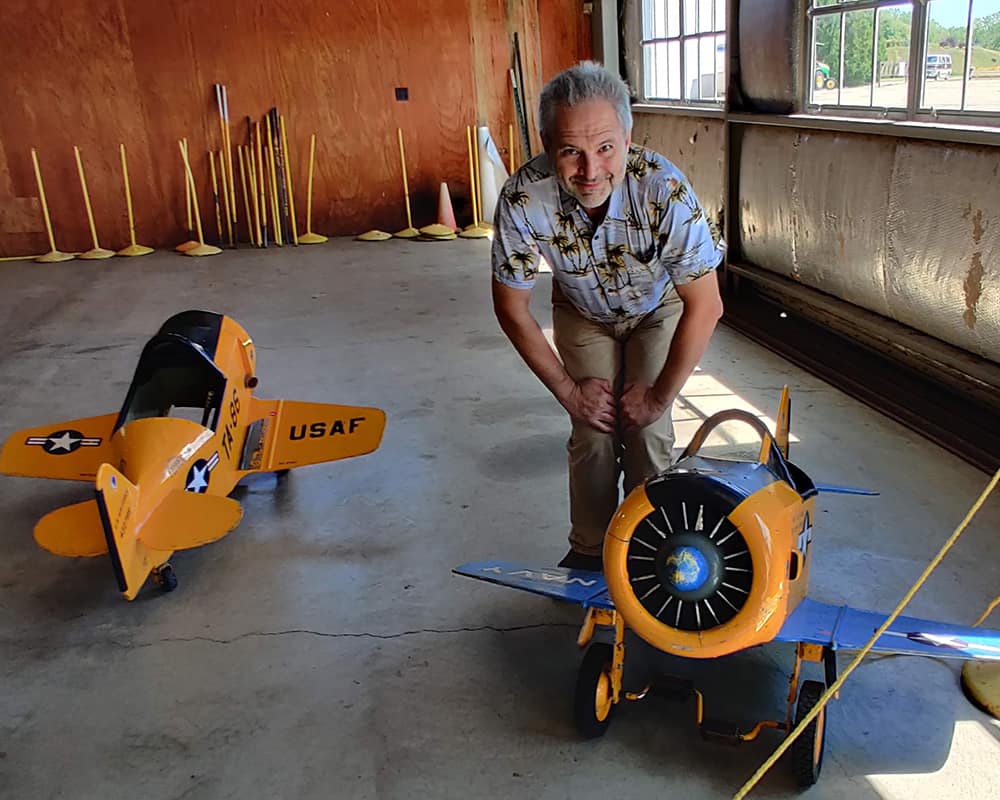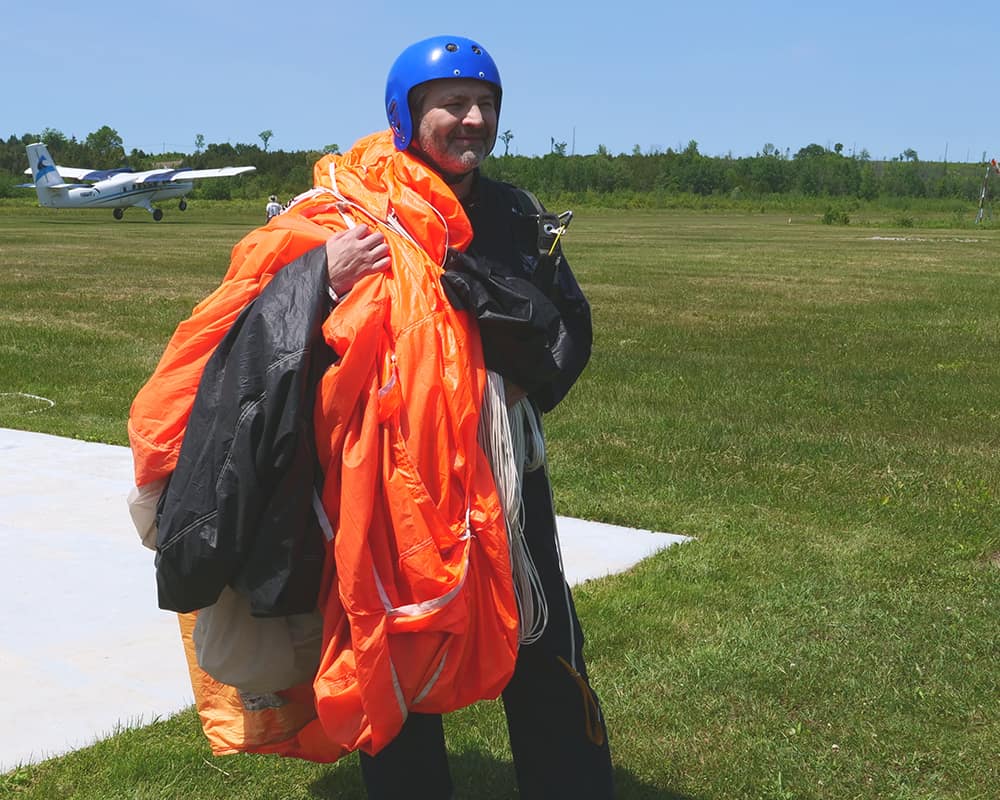

For This Successful Eagle Entrepreneur, the Learning Never Stops

Established business innovator Eugene Pik used Embry-Riddle’s M.S. in Aviation and Aerospace Sustainability program to expand his aviation horizons.
Eugene Pik was born to be an entrepreneur, and he began innovating while growing up in Minsk, Belarus, when it was still part of the Soviet Union.
He continued his technical education after his family emigrated to Israel and later moved to Canada, where he created multiple companies that included fundraising for medical research, developing a bartering system based on the Amazon database and helping medical device manufacturers prepare documentation to get Health Canada and FDA approvals.
That work led him to the doorstep of the aviation industry, where Eugene combined medicine with aviation by leading the development of an eVTOL (electric Vertical Take-Off and Landing) aircraft for air ambulance and other emergency services. His quest for a more solid aviation foundation also led him to the M.S. in Aviation and Aerospace Sustainability at Embry-Riddle Aeronautical University’s Worldwide Campus.
Eugene, who earned his degree in March 2024, is currently CEO at Mevocopter Aerospace, an aviation consulting firm focused primarily on cybersecurity and sustainability and aiming to empower aviation startups with the knowledge and tools they need to navigate the increasingly complex landscape of the industry.
Eugene took a few minutes to discuss his past work, incredible Embry-Riddle experience and his future plans.
Tell us about your background
I was born in Minsk, and I finished high school with 100% marks in every subject and was accepted into the prestigious Faculty of Robots and Robototechnical Systems at the Belarusian Polytechnic Institute. During my studies there, I learned computer programming and wrote a commercial payroll software using the SuperCalc application.
It wasn't easy to be an entrepreneur in the former USSR, but I managed to create a commercial software. This was a challenging task on a PC without a hard drive, using a spreadsheet application — I had to write the complete programming code into each spreadsheet cell.
After my family emigrated to Israel, I worked in computer support and network security and taught computer network design and security at a college. In parallel to my full-time job, I studied and completed the Software Practical Engineer program at The Open University. It wasn't simple, especially because the program was in Hebrew, a language I had to learn from scratch.
How and why did you first get interested in aviation?
While working with medical devices, an opportunity came up, and I started a company called Uniqopter to develop an eVTOL aircraft. One of my talents is identifying and connecting with the right people. I collaborated with Richard Abbott, a brilliant aerospace engineer, and Taras Lyssenko, a skilled business development and government relations professional. Together, we developed a conceptual design for a hybrid eVTOL aircraft, enhancing the characteristics of a Part 27 helicopter for medical applications.
After interviewing multiple air ambulance companies, we discovered they all had similar problems due to their general-purpose helicopters being retrofitted with medical devices. We addressed these issues and created a design suited for a medical air ambulance eVTOL. We also took an unorthodox approach with the intention of making all our blueprints, designs and procedures open source. No one had tried that in the aviation business before, but we believe someone always has to start.
However, after we finished the conceptual design, we placed the project on hold due to challenges such as missing regulations, infrastructure and battery technology limitations. We decided to monitor the market to see what happens with other eVTOL companies and restart this project when the sky clears.
Why did you choose to pursue a master’s degree at Embry-Riddle?
Working with aerospace professionals at Uniqopter made me realize I needed more aviation-specific knowledge. Embry-Riddle was the clear choice as it is known as the “Harvard of Aviation.” The online education option allowed me to study while still working
I chose the M.S. in Aviation and Aerospace Sustainability, specializing in Cybersecurity. Sustainability is a relatively new area focused on keeping our planet livable for the next generation, and cybersecurity is something I have worked on for most of my life, making this degree a perfect fit for me.
What have been some of the highlights of your academic journey at Embry-Riddle?
When I began my first course at Embry-Riddle, I was both surprised and challenged by the strict formatting requirements for my papers. I had never encountered APA7 or any formalized formatting style before. Fortunately, Embry-Riddle offers the VECTOR Virtual Communication Lab, which became an invaluable resource for me.
Early in my studies, I scheduled numerous one-on-one meetings with advisors (at least ten times, if not more) to review my papers and receive guidance. The support I received was exceptional and significantly helped me adapt to these new academic standards.
Another aspect that surprised me was the consistent and structured approach to education at Embry-Riddle. Each course included two to three weekly assignments, with deadlines on the weekend.
This was a stark contrast to my previous educational experience, where students were allowed to study at their own pace and only had to prepare for exams twice a year. That method created an uneven workload and often led to intense periods of cramming. The regular assignment schedule at Embry-Riddle ensured a more balanced and continuous learning process, which ultimately enhanced my understanding and retention of the material.
The completely remote style of education was also new for me, but the professors were always available, quickly answering emails and offering Zoom video conferences or phone calls, which made the education process easier.


Tell us more about the research you’ve done and the papers you’re preparing to present
Throughout my academic journey at Embry-Riddle, I have engaged in a range of research projects and competitions, which included:
Organizing a team for the 2023 ICAO student innovation competition focused on the topic “General Aviation Aircraft as a Meteorological Sensor.” We proposed the creation of a centralized weather data repository leveraging the capabilities of the new ADS-B Version 3 (ADS-B Wx).
For the NASA 2024 student competition, I organized and managed a team that included Assistant Professor Dr. Logan Gerber-Chavez and worked on a paper and video entitled “Enhancing Hurricane Forecasting and Alerts through AI-Driven Analysis of General Aviation Data.” This proposal is particularly beneficial for hurricane prediction, leading to more timely and effective community alerts and responses, marking a considerable advance in disaster preparedness and public safety.
For the AIAA AVIATION Forum, I collaborated with Matthew Berra, Adjunct Professor Dr. Jeff Yearwood and Assistant Professor Dr. Joao Garcia on a research paper titled “Detecting GPS Anomalies in Aviation Using ADS-B: Correlating Coordinate Gaps and GPS Deviations with NOTAM Warnings.” As the first author, I will present this paper on Aug. 2 in Las Vegas.
Another paper where I am a co-author, titled “Empirical Propeller Mass Sizing for Small-Scale Aircraft” and created in collaboration with Associate Professor Dr. Robert Deters, Dr. Or Dantsker from Indiana University and Amy Chang, will also be presented at the AIAA AVIATION Forum 2024.
I am collaborating with Assistant Professor of the Practice Christian Janke on the research paper “Game of Drones, International Drone Statistics.”
I am the solo author of the paper “Airport security: The impact of AI on safety, efficiency, and the passenger experience,” published in the Journal of Transportation Security. The paper examines how AI is transforming airport security by improving threat analysis and identification while addressing ethical and privacy concerns.
My paper “The Pilot Shortage - Implications, Repercussions, and Tried Solutions” was published in the Journal of Air Transport Studies. The article provides a comprehensive analysis of the global pilot shortage, offering insights and strategies for aviation professionals and policymakers to address the issue and ensure the industry's sustainability.
I presented a poster, “GPT-4 Assisted Categorization and Visualization of NTSB UAV Accident Reports,” at Embry-Riddle’s 2024 Discovery Days, and I completed a paper based on that poster, which was submitted to the Journal of Safety Research and is currently in peer review. This study leverages AI to systematically categorize and analyze UAV accident reports, highlighting the prevalence of system failures and emphasizing the need for improved safety standards and policies.
These projects and papers reflect my dedication to addressing critical issues in aviation and aerospace. The collaborative efforts with faculty and peers have been incredibly enriching. I look forward to presenting my findings at various forums.
After two of my peer-reviewed articles were published, some friends and schoolmates asked me to share my thoughts, experiences and advice based on what I had learned about research at Embry-Riddle. Those recollections are here for prospective, current and former students to read.
What are some of your goals for the future?
Aviation has always been my dream, though the path hasn’t always been straight.
As the founder of Mevocopter Aerospace, I'm seeking new consultancy projects in aviation sustainability and cybersecurity with aerospace companies, airports, airlines and manufacturers. I'm also looking to participate in funded research projects focused on aviation sustainability or cybersecurity.
One of my greatest strengths is connecting with the right people, which has been instrumental in my ventures. I leverage this skill to build strong teams and drive successful projects in the aviation industry.
With ambition and a clear vision, I’m ready to take on new challenges in aviation sustainability and cybersecurity. My dream may have taken a winding path, but it has led me to where I am today, ready to soar to new heights.
Anyone interested in working with me can connect on LinkedIn or ResearchGate or reach out via email. I look forward to exploring new opportunities and making impactful connections in the aviation industry.
How will your M.S. degree from Embry-Riddle help you reach those goals?
My degree has given me the technical knowledge, industry insights and professional network I need to pursue and succeed in aviation sustainability and cybersecurity roles, as well as contribute to new research projects and business ventures.
What would you say to an accomplished professional considering an advanced degree at Embry-Riddle?
Eagles soar! What else do we need to add? For those who still need convincing, check the difference between soaring and flying!

